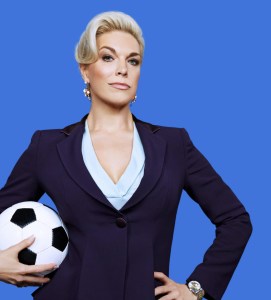How a lively and musical conversation between friends and “equal knobheads” Lena Headey and Hannah Waddingham asks greater questions than a FYC push.
The chorus of giggles and reverberations of songs created on the fly were the first signs that this was no ordinary press conversation. Situated just after the Christmas episode of Ted Lasso, and just before Emmy voting, Cersei Lannister and the Shame Nun reunited on Zoom. And during what could have been a get together over a glass of wine, ended up being a discussion about wine boarding, a celebration of talents and small window into a friendship.
Courtesy of Entertainment Weekly, the event began with a screening of Episode 9 of Season 1 of Ted Lasso, “All Apologies.” Viewers were then privy to a pre-recorded Zoom conversation between friends, former co-workers, and “flatmate lovers” (per an improvised song), Lena Headey and Hannah Waddingham.
The conversation bubbled with mutual respect and admiration; a joyous, funny, and awkward conversation revealing their mutual discomfort at taking compliments along with their deep friendship.
When Ted Lasso was released, detail oriented viewers and IMDB aficionados were quick to point out that Hannah Waddingham, who plays A.F.C Richmond owner and “da boss” Rebecca Welton, was also featured in Game of Thrones as Septa Unella, otherwise known as the Shame Nun (you know the GIF!).
But those scenes, and particularly their reunion in Season 6 with wine boarding are also the root of uncomfortable moments for the actors. The revelation was made awkwardly, and a bit surprisingly, during their conversation. While it created “wicked telly,” the stars referred to their experience as collective PTSD; something they tried to “just get on with” while knowing that they “actually aren’t going to kill me” during wine boarding.
Will we hear about PTSD from the set of Ted Lasso? Maybe. Maybe not. Maybe it’s something for Dr. Sharon to handle.

On the surface, Ted Lasso seems like a light hearted comedy, a show that might poke fun at a stereotypical Midwestern football loving guy, jokes sprinkled here and there about Americans attempting to work in Britain (tea, teeth, the usual), aiming for that generic sitcom feel. That is just the beginning, and, an intentional set-up for a larger pay off, like so much of the Ted Lasso story. Rather, Ted Lasso has been embraced as a culture, a way of being, and the instigator of an endless supply of reflective articles, not unlike this one. In this way, the show becomes harder to define and characterize, not just as a comedy, but as a piece of media. What happens when a show changes people and impacts the audience in a new way? What happens when everyone involved, and everyone who watches it, believes it can actually make people better?
And so a question develops, hot off the heels of a FYC campaign: Which show should mean more to society? Be awarded more? And why? Which TV show should mean more to us, the one with many years, several awards (Lena was a five time nominee; The pair concluded that a snack or flask pouch should be at the ready for Hannah’s first time experience, for the record) and groundbreaking technology? The one that set the record for most stunt people on fire? The one that garnered the most Emmy nominations for a first season? (Those are different answers by the way).
Do we need to compare? Do we need to return to the numbers? Do we accept that a show with potentially “icky” to use their words, filming experiences may have set a new friendship into motion? And, should we even be asking the question? Do we need apologies, much like the ones on display in “All Apologies?”
There is no definitive answer here; no one size fits all conclusion. Just like these tv shows, as we approach them again and again, binaries feel like they should be tossed out the window. When you look at it enough times, even tv static has color.
By the end of their short, 15-minute conversation, audience members wondered if what they witnessed was an FYC conversation or just two friends who happened to be on EW’s Zoom. And perhaps, it is that connection, and those moments we prefer to remember, those that Ted Lasso creates or another shared experience spontaneously create into being, that can be continued into the awards season, and beyond.




















![[Book Review] The Blade Itself (The First Law Trilogy) by Joe Abercrombie](https://bendthekneegot.com/wp-content/uploads/2018/01/1516047103_maxresdefault-218x150.jpg)
















